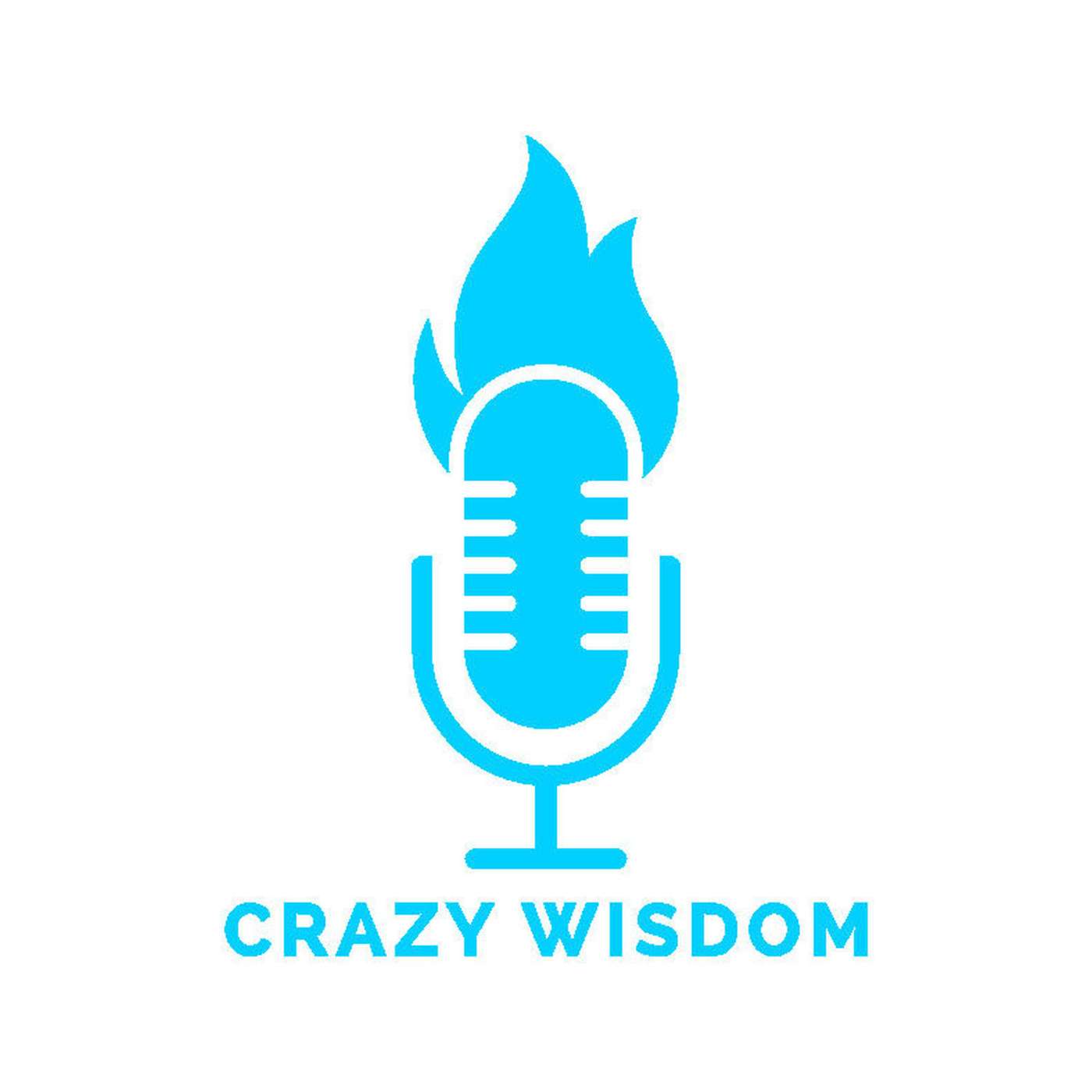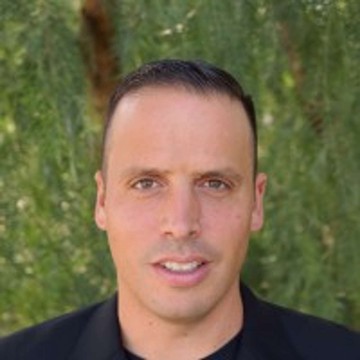

Crazy Wisdom
Stewart Alsop
In his series "Crazy Wisdom," Stewart Alsop explores cutting-edge topics, particularly in the realm of technology, such as Urbit and artificial intelligence. Alsop embarks on a quest for meaning, engaging with others to expand his own understanding of reality and that of his audience. The topics covered in "Crazy Wisdom" are diverse, ranging from emerging technologies to spirituality, philosophy, and general life experiences. Alsop's unique approach aims to make connections between seemingly unrelated subjects, tying together ideas in unconventional ways.
Episodes
Mentioned books

Jan 27, 2025 • 1h 5min
Episode #430: From Sci-Fi to Reality: The Human Side of AI and Its Global Impact
In this episode of Crazy Wisdom, Stewart Alsop sits down with Diego Basch, a consultant in artificial intelligence with roots in San Francisco and Buenos Aires. Together, they explore the transformative potential of AI, its unpredictable trajectory, and its impact on everyday life, work, and creativity. Diego shares insights on AI's role in reshaping tasks, human interaction, and global economies while touching on his experiences in tech hubs like San Francisco and Buenos Aires. For more about Diego's work and thoughts, you can find him on LinkedIn or follow him on Twitter @dbasch where he shares reflections on technology and its fascinating intersections with society.Check out this GPT we trained on the conversation!Timestamps00:00 Introduction to the Crazy Wisdom Podcast00:20 Excitement and Uncertainty in AI01:07 Technology's Impact on Daily Life02:23 The Evolution of Social Networking02:43 AI and Human Interaction03:53 The Future of Writing in the Age of AI05:27 Argentina's Unique Linguistic Creativity06:15 AI's Role in Argentina's Future11:45 Cybersecurity and AI Threats20:57 The Evolution of Coding and Abstractions31:59 Troubleshooting Semantic Search Issues32:30 The Role of Working Memory in Coding34:46 Human Communication vs. AI Translation35:46 AI's Impact on Education and Job Redundancy37:37 Rebuilding Civilization and Knowledge Retention39:54 The Resilience of Global Systems41:32 The Singularity Debate45:01 AI Integration in Argentina's Economy51:54 The Evolution of San Francisco's Tech Scene58:48 The Future of AI Agents and Security01:03:09 Conclusion and Contact InformationKey InsightsAI's Transformative Potential: Diego Basch emphasizes that artificial intelligence feels like a sci-fi concept materialized, offering tools that could augment human life by automating repetitive tasks and improving productivity. The unpredictability of AI's trajectory is part of what makes it so exciting.Human Adaptation to Technology: The conversation highlights how the layering of technological abstractions over time has allowed more people to interact with complex systems without needing deep technical knowledge. This trend is accelerating with AI, making once-daunting tasks more accessible even to non-technical individuals.The Role of Creativity in the AI Era: Diego discusses how creativity, unpredictability, and humor remain uniquely human strengths that current AI struggles to replicate. These qualities could play a significant role in maintaining human relevance in an AI-enabled world.The Evolving Nature of Coding: AI is changing how developers work, reducing the need for intricate coding knowledge while enabling a focus on solving more human-centric problems. While some coding skills may atrophy, understanding fundamental principles remains essential for adapting to new tools.Argentina's Unique Position: The discussion explores Argentina’s potential to emerge as a significant player in AI due to its history of technological creativity, economic unpredictability, and resourcefulness. The parallels with its early adoption of crypto demonstrate a readiness to engage with transformative technologies.AI and Human Relationships: An AI-enabled economy might allow humans to focus more on meaningful, human-centric work and relationships as machines take over repetitive and mechanical tasks. This could redefine the value humans derive from work and their interactions with technology.Risks and Opportunities with AI Agents: The development of autonomous AI agents raises significant security and ethical concerns, such as ensuring they act responsibly and are not exploited by malicious actors. At the same time, these agents promise unprecedented levels of efficiency and autonomy in managing real-world tasks.

Jan 24, 2025 • 47min
Episode #429: Breaking Free from BS Jobs: AI’s Role in a More Creative Future
Reuben Bailon, an AI training expert and tech innovator, dives into the fascinating world of artificial intelligence and its impact on the future of work. He discusses the transformative power of AI in eliminating monotonous tasks and enhancing productivity across sectors. Reuben also explores the tension between traditional businesses and innovative startups amidst rapid technological shifts. Additionally, he addresses the potential of personalized AI tools and the ethical implications of data ownership in our increasingly automated society.

Jan 20, 2025 • 48min
Episode #428: From DARPA to Neuralink: The Future We Can't Imagine
In this conversation, Stewart Alsop welcomes Ekue Kpodar for a thought-provoking exploration of technology, history, and societal evolution. The discussion traverses topics such as DARPA's pivotal role in technological innovation, the symbiotic relationship between governments and big tech, and the trajectory of AI in reshaping everything from scientific research to social organization. They touch on the influence of open-source movements, the philosophical underpinnings of accelerationism, and the complex ethical landscapes AI introduces. You can connect with Ekue through Twitter or LinkedIn.Check out this GPT we trained on the conversation!Timestamps00:00 Introduction and Guest Welcome00:24 Diving into DARPA's Origins02:21 DARPA's Technological Contributions03:44 Government and Big Tech Interactions05:07 Historical Context of Technology and Empires11:58 Big Science vs. Little Science16:55 AI's Role in Future Research32:40 Political Implications of AI and Technology41:14 Future of Human and AI Integration47:03 Conclusion and FarewellKey InsightsDARPA’s Role in Modern Technology: The conversation highlights DARPA as a central player in shaping key technological advancements such as the internet and the early development of Siri. The agency’s strategy of fostering innovation through collaboration with universities and private companies underpins much of the progress in tech we see today, illustrating how government initiatives have historically catalyzed transformative breakthroughs.The Symbiosis of Government and Big Tech: A recurring theme is the deeply intertwined relationship between governments and big tech companies. From providing cloud services to pioneering research projects, companies like AWS and Oracle play a vital role in national operations, emphasizing how modern economies depend on these partnerships to push forward technological frontiers.Generative AI and Science Evolution: Ekue Kpodar discusses how generative AI is revolutionizing fields like biology and chemistry. Tools like protein folding models and molecule generators are paving the way for breakthroughs in medicine and materials science, demonstrating how AI can accelerate complex research that previously required vast resources and specialized teams.Centralization vs. Decentralization: The episode delves into how societal systems toggle between centralized and decentralized models. While the U.S. strikes a balance, contrasting approaches like China’s centralized focus highlight the impact of governance structures on innovation and societal organization.Philosophy of Accelerationism: The discussion explores accelerationism, a concept arguing that the rapid advancement of technology and capitalism could lead to societal upheaval, potentially necessitating a systemic restart. This philosophical lens is applied to understand the dissonance between human values and the unchecked growth of AI and economic systems.AI as a Management Tool and Existential Threat: Both hosts ponder the future role of AI in society, ranging from its potential to replace human managers with algorithmic oversight to Elon Musk’s controversial stance on merging humanity with AI through initiatives like Neuralink. These reflections underscore the growing influence of AI in shaping human interactions and decisions.Imagination and the Cost of Knowledge: The advent of AI significantly lowers the cost of generating and accessing new knowledge, which raises profound questions about how humanity will adapt. The hosts speculate on how AI might impact creativity, societal evolution, and even the formation of entirely new paradigms that transcend existing frameworks of understanding.

Jan 17, 2025 • 50min
Episode #427: Are We Cyborgs Already? Neurology, Philosophy, and the Next Human Chapter
In this engaging conversation on the Crazy Wisdom podcast, Stewart Alsop talks with neurologist Brian Ahuja about his work in intraoperative neurophysiological monitoring, the intricate science of brainwave patterns, and the philosophical implications of advancing technology. From the practical applications of neuromonitoring in surgery to broader topics like transhumanism, informed consent, and the integration of technology in medicine, the discussion offers a thoughtful exploration of the intersections between science, ethics, and human progress. Brian shares his views on AI, the medical field’s challenges, and the trade-offs inherent in technological advancement. To follow Brian’s insights and updates, you can find him on Twitter at @BrianAhuja.Check out this GPT we trained on the conversation!Timestamps00:00 Introduction to the Crazy Wisdom Podcast00:21 Understanding Intraoperative Neurophysiological Monitoring00:59 Exploring Brainwaves: Alpha, Beta, Theta, and Gamma03:25 The Impact of Alcohol and Benzodiazepines on Sleep07:17 The Evolution of Remote Neurophysiological Monitoring09:19 Transhumanism and the Future of Human-Machine Integration16:34 Informed Consent in Medical Procedures18:46 The Intersection of Technology and Medicine24:37 Remote Medical Oversight25:59 Real-Time Monitoring Challenges28:00 The Business of Medicine29:41 Medical Legal Concerns32:10 Alternative Medical Practices36:22 Philosophy of Mind and AI43:47 Advancements in Medical Technology48:55 Conclusion and Contact InformationKey InsightsIntraoperative Neurological Monitoring: Brian Ahuja introduced the specialized field of intraoperative neurophysiological monitoring, which uses techniques like EEG and EMG to protect patients during surgeries by continuously tracking brain and nerve activity. This proactive measure reduces the risk of severe complications like paralysis, showcasing the critical intersection of technology and patient safety.Brainwave Categories and Their Significance: The conversation provided an overview of brainwave patterns—alpha, beta, theta, delta, and gamma—and their connections to various mental and physical states. For instance, alpha waves correspond to conscious relaxation, while theta waves are linked to deeper relaxation or meditative states. These insights help demystify the complex language of neurophysiology.Transhumanism and the Cyborg Argument: Ahuja argued that humans are already "cyborgs" in a functional sense, given our reliance on smartphones as extensions of our minds. This segued into a discussion about the philosophical and practical implications of transhumanism, such as brain-computer interfaces like Neuralink and their potential to reshape human capabilities and interactions.Challenges of Medical Technology Integration: The hype surrounding medical technology advancements, particularly AI and machine learning, was critically examined. Ahuja highlighted concerns over inflated claims, such as AI outperforming human doctors, and stressed the need for grounded, evidence-based integration of these tools into healthcare.Philosophy of Mind and Consciousness: A recurring theme was the nature of consciousness and its central role in both neurology and AI research. The unresolved "hard problem of consciousness" raises ethical and philosophical questions about the implications of mimicking or enhancing human cognition through technology.Trade-offs in Technological Progress: Ahuja emphasized that no technological advancement is without trade-offs. While tools like CRISPR and mRNA therapies hold transformative potential, they come with risks like unintended consequences, such as horizontal gene transfer, and the ethical dilemmas of their application.Human Element in Medicine: The conversation underscored the importance of human connection in medical practice, particularly in neurology, where patients often face chronic and emotionally taxing conditions. Ahuja's reflections on the pitfalls of bureaucracy, private equity in healthcare, and the overemphasis on defensive medicine highlighted the critical need to prioritize patient-centered care in an increasingly technological and administrative landscape.

Jan 13, 2025 • 1h 7min
Episode #426: The Voice as Portal: A Journey into Consciousness, Creation, and Connection
Join Reya Manna, founder of the Song Keepers School, as she discusses the transformative power of singing and its healing potential discovered during shamanic ceremonies. Explore the connection between psychedelics and sound, and how modern distractions impact spiritual journeys. Reya dives into the dangers of AI's detachment from human essence and the importance of reclaiming ancestral wisdom. She emphasizes nurturing authentic self-expression and introduces her Song Keepers School, offering a unique path to connect voice with ancient traditions.

Jan 10, 2025 • 44min
Episode #425: Agents, Evals, and the Future of AI: A Pragmatic Take with Christopher Canal
Christopher Canal, co-founder of Equistamp and an expert in AI evaluations and safety, discusses the critical need for thorough assessments of AI capabilities. He highlights the significance of AI agents and their real-time abilities while addressing safety challenges, such as data leakage and performance limitations. Canal also tackles the ethical dilemmas in AI development, emphasizing the importance of proper metrics to gauge AI's impact on society. His insights reveal how Equistamp aims to foster responsible AI innovations through third-party evaluations.

5 snips
Jan 6, 2025 • 1h 13min
Episode #424: Resonance Revolution: Marketing, Neuroscience, and the Future of Human Decision-Making
Christopher Demetrakos, founder and CEO of Manzanita KK, dives into the fascinating world of neuroscience-driven marketing. He discusses how emotional resonance revolutionizes decision-making and consumer behavior. Topics include the impact of neurochemicals on marketing strategies and the challenges of media saturation in modern society. Demetrakos also explores cultural identity and the future of personal connections in a digital landscape, highlighting the balance between individual authenticity and societal norms.

Jan 3, 2025 • 59min
Episode #423: Currency Wars, AI Dreams, and the Digital Feudal Lords
In this episode of the Crazy Wisdom Podcast, host Stewart Alsop chats with Gianluca Minoprio, the innovative mind behind Amanu and AmanuPay, a payment app aiming to make digital currency as seamless as cash. The conversation spans groundbreaking technology like ultrasound for contactless payments, the philosophy of currency competition inspired by Hayek's The Denationalization of Money, and the implications of blockchain, AI, and digital feudalism in shaping our future. For more updates, follow Gianluca on Twitter @jlminoprio or check out AmanuPay.Check out this GPT we trained on the conversation!Timestamps00:00 Introduction to the Crazy Wisdom Podcast00:23 Innovative Payment Solutions with AmanuPay01:06 Challenges and Solutions in Contactless Payments02:17 The Concept and Technology Behind Ultrasound Payments03:24 The Future of Currency and Payment Systems06:36 Exploring Hayek's Theories on Currency08:38 Global Currency Competition and Its Implications19:59 The Role of Debt in Modern Economies21:58 The Intersection of Crypto and Traditional Finance23:02 The Evolution of the Internet and Its Impact on Finance26:08 Blockchain vs. Internet: Understanding the Differences29:11 Smart Contracts and Decentralized Applications30:06 The Importance of Oracles in Blockchain Networks31:48 Emerging Technologies and the Future of Computing33:03 Bitcoin as the Future Currency33:30 Government Resistance to Bitcoin34:25 Institutional Adoption of Bitcoin34:50 Global Fragmentation and Bitcoin35:52 Communism and Naivete37:24 Digital Feudalism Explained37:46 Elon Musk: The Digital Warlord41:01 Robotic Advancements and Real Steel43:27 AI and Human Augmentation48:16 AI in Education and Coding55:50 The Future of AI and Software Engineering57:19 Conclusion and Final ThoughtsKey InsightsRevolutionizing Contactless Payments: Gianluca Minoprio introduces AmanuPay, a groundbreaking payment app that leverages ultrasound technology for phone-to-phone transactions. Unlike NFC, which requires specialized hardware, ultrasound enables seamless and decentralized payment exchanges between devices using microphones and speakers, paving the way for more inclusive and cost-effective digital currency solutions.Currency Competition as a Catalyst for Innovation: Drawing inspiration from Hayek's The Denationalization of Money, Gianluca discusses the concept of currency competition, where multiple currencies, including cryptocurrencies, could coexist and compete freely. This paradigm challenges centralized financial systems and encourages innovation, potentially leading to better financial tools and user experiences.AI as a Game-Changer in Development: AI tools like OpenAI’s GPT and Copilot are reshaping the development process. Gianluca shares how AI-enabled coding helped him prototype a keyboard-integrated wallet for AmanuPay in record time during a hackathon. This reflects the growing potential of AI to democratize access to complex development capabilities, enabling rapid innovation.Blockchain’s Potential in a Fragmented World: The episode highlights blockchain's role in offering a neutral, trustless medium for global transactions, particularly in a politically and economically fragmented world. Gianluca suggests that Bitcoin and other decentralized currencies are poised to become indispensable tools for cross-border trade and institutional collaboration.The Challenges of User Experience in Decentralized Systems: Currency competition brings its own set of challenges, particularly in user experience. Gianluca envisions solutions like integrated wallets that automatically convert currencies during transactions, eliminating the complexity of handling multiple forms of payment in a decentralized economy.The Rise of Digital Feudalism: Stewart and Gianluca explore the concept of "digital feudalism," where influential individuals like Elon Musk operate as modern digital warlords, leveraging decentralized technologies to wield power outside traditional hierarchies. This evolution reflects a blend of feudal and capitalist structures driven by competency and innovation.The Role of AI in Education and Creativity: AI’s impact on education and creativity is transformative. Gianluca shares how AI-enhanced learning and development tools can streamline education by focusing on core creative and analytical skills while automating repetitive tasks. He emphasizes that while AI is excellent for prototyping, human creativity remains irreplaceable for truly novel and groundbreaking innovations.

Dec 30, 2024 • 54min
Episode #422: Mining the Stars: The Future of Resources with Matthew Gialich
On this episode of the Crazy Wisdom Podcast, host Stewart Alsop chats with Matthew Gialich, co-founder and CEO of AstroForge, about the fascinating world of asteroid mining. They explore how advances in technology and reduced launch costs are enabling humanity to tap into the untapped resources of metallic asteroids, the challenges of deep space operations, and the long-term vision for making asteroid mining economically viable. Listeners can follow AstroForge for updates on LinkedIn and Twitter, and connect with Matthew directly for inquiries on his LinkedIn or at matt@astroforge.io.Check out this GPT we trained on the conversation!Timestamps00:00 Introduction to the Crazy Wisdom Podcast00:17 Asteroid Mining: Current Knowledge and Discoveries01:58 Near-Earth Asteroids and Their Potential04:08 The Value of Platinum Group Metals06:21 Spacecraft Operations and Human Involvement11:06 Asteroid Missions and Scientific Discoveries21:38 Economic and Environmental Implications of Space Mining27:04 Collaborating with SpaceX for Asteroid Missions27:42 Challenges and Opportunities in Moon Mining29:20 Navigating Gravity in Space Missions30:09 The Origin Story of Astroforge33:32 Asteroid Mining: Past and Present34:29 The Future of Space Industry and Business38:05 Radiation Challenges in Deep Space40:44 Thermal Management in Spacecraft42:43 Innovations in Robotics and Manufacturing45:37 The Role of Software in Space Startups50:10 Recruiting Top Talent for Astroforge51:37 Knowledge Management and Team Structure52:40 Staying Connected with AstroforgeKey InsightsAsteroid Mining is Becoming Feasible: Advancements in telescope technology and reduced launch costs are paving the way for asteroid mining to transition from science fiction to reality. AstroForge is focused on mining metallic asteroids rich in platinum group metals, which are critical for various industrial applications.Near-Earth Asteroids Offer Better Opportunities: Contrary to Hollywood depictions of mining in the asteroid belt, near-Earth asteroids are more accessible and practical targets for mining. These asteroids are closer to Earth and contain valuable materials, making them ideal for the initial stages of space resource exploitation.The Importance of Platinum Group Metals: Platinum, rhodium, palladium, and other platinum group metals are integral to modern technology, found in everything from electronics to industrial equipment. Mining these materials in space could revolutionize supply chains and reduce the environmental impact of terrestrial mining.The Role of Technology in Exploration: AstroForge uses cutting-edge sensors, spectrometry, and imaging systems to study and identify the best asteroids for mining. These technologies allow for remote analysis of asteroid composition, paving the way for efficient resource extraction missions.Spacecraft Design for Deep Space: AstroForge is designing spacecraft optimized for deep space exploration, which operate in the harsh conditions beyond Earth’s gravity well. Challenges like radiation, thermal management, and propulsion systems are central to the company’s engineering efforts.Economic and Environmental Impacts of Space Mining: Space mining has the potential to make terrestrial mining for certain materials economically obsolete, reducing environmental damage and the hazardous conditions associated with deep-earth mining operations. The company’s vision includes making Earth a better place by shifting resource extraction to space.The Evolution of the Space Industry: The space sector is evolving rapidly, with private companies leading the charge in areas traditionally dominated by government agencies. AstroForge’s mission is a testament to this shift, focusing on commercializing deep space exploration and mining with innovative strategies and cost-efficient technologies.

Dec 27, 2024 • 1h 10min
Episode #421: Argentina Unfiltered: Chaos, Crypto, and Creative Survival
In this episode of the Crazy Wisdom Podcast, Stewart Alsop talks with guest Saila about Argentina's fascinating socio-economic dynamics, its chaotic history, and potential future under the current government. Topics range from Argentina's unique financial practices—like the "blue dollar" system and the impact of inflation on everyday life—to global geopolitical shifts, the role of bureaucracy, and the rise of multipolarity. They also explore the opportunities and challenges for crypto and fintech in Argentina, drawing connections to innovation spurred by economic adversity. Check out Saila on Twitter at @sailaunderscore for more insights.Check out this GPT we trained on the conversation!Timestamps00:00 Introduction and Welcome00:13 Argentina's Economic Situation00:56 Understanding the Blue Rate03:20 Psychological Impact of Inflation07:17 Global Political Dynamics14:30 AI and Human Perception21:23 Bureaucracy and Governance28:20 Historical Context and Future Predictions37:36 The Birth of ARPA and NASA38:21 Crazy Ideas and Vietnam39:11 The Internet's Origin and Tech's Evolution39:46 The Political Silence of Tech Giants40:58 The Dark Matter of Eligibility41:30 Navigating the Tech and Finance Worlds48:37 The Reality of Crypto in Argentina58:36 Argentina's Unique Financial Landscape01:07:20 Conclusion and Final ThoughtsKey InsightsArgentina’s Economic Complexity and the Blue Dollar: Argentina’s economic system is uniquely chaotic, characterized by a dual exchange rate system with the "blue dollar" or parallel exchange rate operating alongside the official rate. This system reflects a deeply ingrained culture of financial adaptation and innovation, where residents navigate inflation and economic instability with remarkable dexterity. The resilience and pragmatism of Argentines in the face of such challenges have made their everyday understanding of economics highly nuanced and practical.The Global Perception of Argentina Under Javier Milei: Under the leadership of Javier Milei, Argentina is at a critical juncture, attempting to shift from decades of economic chaos to potential stabilization. Despite initial skepticism, Milei's administration has managed to maintain a credible fiscal policy, such as adhering to a zero primary deficit. This success challenges both local and global expectations, showcasing how Argentina’s political narrative can surprise even seasoned economists.The Global Shift from Unipolarity to Multipolarity: The conversation reflects on the decline of the unipolar world order dominated by the United States and the rise of a more fragmented multipolar reality. With China as a prominent actor but inexperienced in global leadership, the dynamics of international power are evolving. The U.S. faces a choice between deliberate withdrawal from global dominance or grappling with a loss of influence—a process that holds implications for countries like Argentina operating on the periphery.The Power of Illegibility in Systems and Markets: Saila introduces the concept of "illegibility," where the real value in systems often lies in aspects that are not immediately visible or measurable. This is particularly true in environments like Argentina, where formal systems often fail, and informal networks and practices flourish. The same holds in global markets and innovation hubs, where the most significant opportunities often emerge from navigating the unspoken or unseen rules.The Role of Crypto in Argentina’s Financial Landscape: Argentina has become a critical testbed for cryptocurrency applications due to its economic instability and limited access to traditional credit markets. Stablecoins, in particular, have found real-world use cases as tools for saving and transacting in a volatile economy. This positions Argentina as an unlikely but important center for crypto innovation, driven by necessity rather than speculation.Innovation Through Constraint: Economic adversity in Argentina has sparked remarkable creativity and ingenuity among its population. From unique financial practices like partial cash housing transactions to unconventional uses of stablecoins, the constraints of the system have fostered innovation. This serves as a case study in how challenging environments can generate solutions with broader applicability, even in more stable economies.Bureaucracy as an Autonomous Agent: The conversation draws parallels between bureaucratic systems in Argentina and those in developed nations like the U.S., highlighting how they often evolve into semi-autonomous entities prioritizing their survival. Argentina’s overgrown bureaucracy has contributed to inefficiency and economic decline, yet similar patterns of self-preservation and stagnation are visible in Western governments and institutions as well.


